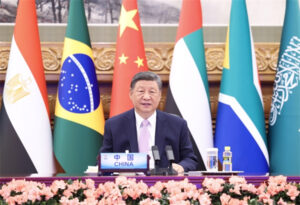Hiroshima marks nuclear bombing’s 78th anniversary

Hiroshima, The Gulf Observer: Hiroshima marked the 78th anniversary of the city’s nuclear bombing by the United States on Sunday after its nuclear legacy took center stage when the western Japan city hosted the summit of the Group of Seven major economies in May.
In his annual Peace Declaration delivered at the ceremony in the Peace Memorial Park, Mayor Kazumi Matsui hailed the G-7 leaders’ historic visit to the park and its atomic bomb museum as proof that the “spirit” of Hiroshima had reached them, but also urged policymakers to abandon the idea that nuclear weapons deter war
“Leaders around the world must confront the reality that nuclear threats now being voiced by certain policymakers reveal the folly of nuclear deterrence theory,” Matsui said, adding, “They must immediately take concrete steps to lead us from the dangerous present toward our ideal world.”
Prime Minister Fumio Kishida, who attended the event, said in his speech, “The path to nuclear disarmament has become more perilous due to deepening international divisions and nuclear threats by Russia.”
A moment of silence was observed at 8:15 a.m., the exact time when the uranium bomb was dropped by the U.S. bomber Enola Gay and detonated over the city on Aug. 6, 1945, killing an estimated 140,000 people by the end of the year
“It is crucial to reinvigorate international momentum toward a ‘world without nuclear weapons’ once again,” he added.
A lawmaker whose constituency is in the city, Kishida was instrumental in bringing the G-7 leaders to Hiroshima as part of his aim to promote efforts toward disarmament amid growing fears of nuclear war following Russia’s invasion of Ukraine.
On the first day of the summit, the leaders of the G-7, including nuclear powers Britain, France and the United States, made an unprecedented joint visit to the Hiroshima Peace Memorial Museum and met 86-year-old atomic bomb survivor Keiko Ogura.
“I believe our spirit is now engraved in their hearts,” Matsui said of the event’s outcome and called on all policymakers to “follow in the footsteps of the leaders who attended the G-7 Hiroshima Summit by visiting Hiroshima and sharing widely their desire for peace.”
He also stressed that civil society has an increasingly important role to play by urging “policymakers to abandon nuclear deterrence in favor of a peaceful world.”
The summit produced the G-7’s first-ever joint document on nuclear disarmament, titled the Hiroshima Vision, which called the Nuclear Non-Proliferation Treaty the “cornerstone” of nonproliferation and the “foundation” for disarmament.
Kishida said the visit had allowed the leaders to “engage directly with the reality of the bombing and people’s wishes for peace.”
He also hailed the contribution by the vision statement, saying “international society’s momentum toward a world without nuclear weapons has increased” as a result of it.
The document’s reception by atomic bomb survivors, known as hibakusha, has been mixed. A Kyodo News survey taken after the summit showed the statement was viewed negatively by 51.7 percent of those polled, of which 59 percent cited the lack of any mention of the Treaty on the Prohibition of Nuclear Weapons.
Japan has not participated in the treaty, which went into effect in January 2021 and bans the use of nuclear arms. Instead, it continues to back the nonproliferation treaty.

While Matsui welcomed the G-7 leaders’ joint vision document, he also urged Japan to join the nuclear weapons ban treaty and participate at least as an observer at the second meeting of the parties to the treaty, set for November.
U.N. Secretary General Antonio Guterres said in a statement that more should follow the example of the leaders in visiting the city “because the drums of nuclear war are beating once again.”
“The only way to eliminate the nuclear risk is to eliminate nuclear weapons,” said the statement read out by Izumi Nakamitsu, U.N. undersecretary general and high representative for disarmament affairs.
Among the 50,000 people in attendance at the Hiroshima commemoration were representatives from 111 countries and the European Union, the highest number on record. Like last year, Russia and Belarus have not been invited due to the invasion of Ukraine.
Three days after Hiroshima was leveled by the atomic bomb known as “Little Boy,” the United States dropped a second device on the southwestern city of Nagasaki. World War II ended six days later, when Japan surrendered to the Allied forces.
Government figures, as of the end of March, showed there were 113,649 officially recognized survivors of both attacks, down 5,346 from the previous year, with their average age standing at over 85.
While 9,350 hibakusha died in fiscal 2022, the decline in the total figure was partially offset by an expansion in recognitions from April 2022 of some individuals exposed to radioactive “black rain” that followed the bombings.


